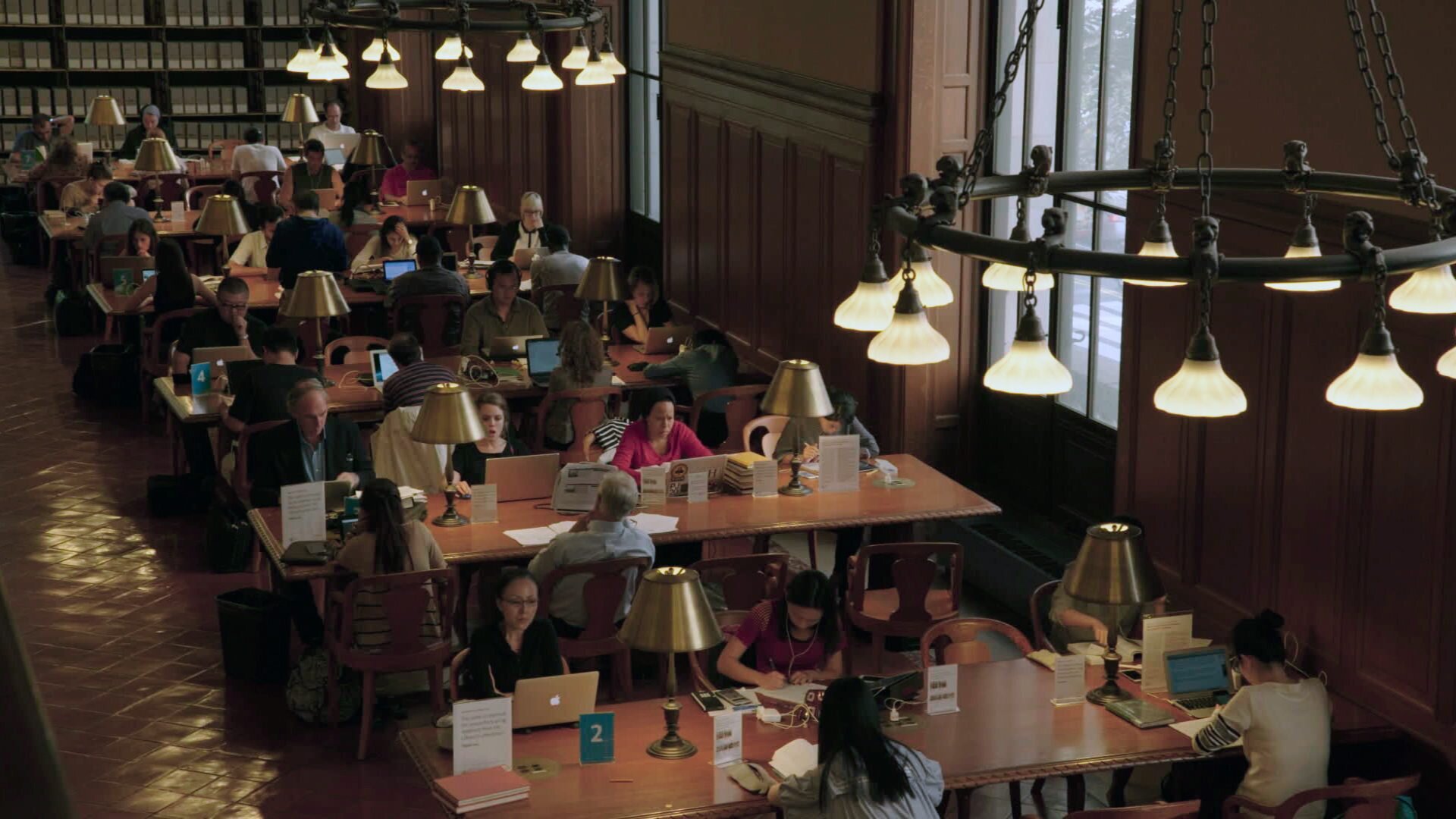Three Films Bring the World of Books to Amsterdam's Documentary Film Festival

The 30th edition of the of Amsterdam International Documentary Film Festival (IDFA) opened on 15 November and continues until 26 November, programming no fewer than 300 documentaries, introducing the viewers to different people and places through the eyes of filmmakers. Three very different films — Eating Animals, Ex-Libris: The New York Public Library, and Dreaming Murakami — bring books to the screen through adaptation, exploration and imagination.
Still from Ex Libris - The New York Public Library by Frederick Wiseman, United States, 2017
Eating Animals
When Jonathan Safran Foer’s book Eating Animals was published in 2009, it made Nathalie Portman turn from vegetarianism to veganism. Both the writer and the actor decided the book should be made into a film and asked filmmaker Christopher Quinn if he would like to make the documentary.
“From the first discussions I had with Nathalie and Jonathan,” said Quinn during the Q&A following the screening of the film, “I knew that I didn’t want to make this a first-person journey, I didn’t want to replicate the same process Jonathan went through in the book. It is great and it is one of the reasons why I love the book – which is a personal experience about his grandmother going through the Holocaust. It is very profound.” Quinn added that his previous films were always character-driven and that he liked to stay close to his subjects, as he does brilliantly in Eating Animals. It allows him to “exist with them for a while and let them tell the bigger story through their own eyes.”
This approach makes the documentary a companion to the book rather than a replica. The testimonies from the farmers add another layer to the narrative: “the rusting of America can be felt in every breath of the turkey farmer,” said Quinn. His perspective is intelligently layered and refreshingly non-militant or preachy for a documentary showcasing the damages farming and giant corporations cause to animals; to society and its most vulnerable communities; and to the environment. A combination of carefully used archival footage from slaughterhouses, interviews, informative passages narrated by Nathalie Portman, and beautifully poetic shots of the American rural landscape make Eating Animals more than a film about animal welfare and social justice. It is also an ode to the beauty of nature, and a cry for more humanity in a rotten system.
Ex-Libris: The New York Public Library
Ex-Libris: The New York Public Library is a three-and-a-half-hour-long love letter to libraries and every single person involved in keeping libraries alive. Frederick Wiseman, an extraordinary filmmaker whose rich oeuvre spans more than half a century and close to 50 films – including previous focuses on institutions, such as the National Gallery in 2014 – offers an incisive insight into this iconic American institution. We see fragments from public conversations held at the New York Public Library with writers and artists such as Richard Dawkins, Elvis Costello, Patti Smith, Yusef Komunyakaa or Ta-Nehisi Coates, highlighting such themes as the beauty of facts, poetry in science, art and politics, the role of autobiography, slavery, or the African-American experience. Front stage and behind the scenes, Ex-Libris goes everywhere: From the boardroom to the education work and outreach programmes, to the office and technical staff, Wiseman shows us, in total absence of any hierarchy, that every single person working for this institution deeply cares. While doing so, the film also highlights the relevance of libraries and their key role within communities. Ex-Libris also offers a revealing portrait of America’s socio-political and economical context, and how it affects various communities in drastic ways.
Edmund de Waal is the last artist and writer to appear in Wiseman’s opus: we see him at the end of the film, in a fragment taken from his conversation with Paul Holdengräber, in which de Waal, citing Primo Levi says: “Method is interesting, be very very careful when you describe how something is made, how it comes into shape, as process is not to be skated over, the manner of what we make defines us.” A magnificent conclusion to an unforgettable cinematic journey.
Dreaming Murakami
Filmmaker and writer Nitesh Anjaan attended a lecture by literary translator Mette Holm a few years ago and, mesmerized by the process of translation that Holm described, decided he wanted to explore the subject further. The art of translation isn’t the only thing that motivated Anjaan to make a film with a literary translator as his subject – one writer unites the filmmaker and translator: Haruki Murakami. Based on “Super Frog Saves Tokyo”, one of the short stories in After the Quake, Anjaan's Dreaming Murakami follows Holm as she works on the Danish translation of Kaze no uta o kike (Hear the Wind Sing), the author’s debut novel. The film brings us inside the mind of the translator, but also into the universe of the writer, as perceived by the filmmaker.
A translation between languages, cultures, contexts, and medium, the film is an ode to imagination, creativity, and process. Whether you have read Murakami or not, or are affiliated in any way with translation, you'll find a variety of angles to explore in this cinematic dream. You may find yourself geeking out about all the
Murakami references, or the questions Holm is faced with regarding the process of translation, or you'll simply discover a brand new artistic universe. Imagination knows no limits...
This film overview from IDFA was published on 24 November 2017 on the now decommissioned Bookwitty.com.
Writer, Literary Translator, Artist based in Amsterdam.
Canan (she/they) publishes The Attention Span Newsletter, taking the time to reflect, to analyse and to imagine our societies through writing, art and culture; and City in Translation, fostering discourse and conversations around the art of translation.
